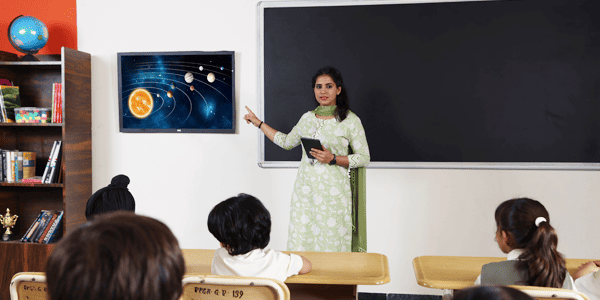Accelerate Learning with Primary Science Tuition Singapore for Young Minds
Accelerate Learning with Primary Science Tuition Singapore for Young Minds
Blog Article
Discovering the Different Teaching Approaches in Primary Science Education And Learning Today
The landscape of primary scientific research education is progressing, with numerous mentor methods gaining importance in contemporary classrooms. Inquiry-based understanding, hands-on experiments, and the combination of technology are redefining exactly how teachers involve young minds. Furthermore, collective methods and distinguished direction are being employed to satisfy the diverse requirements of pupils, improving both interaction and understanding. As we examine these approaches, concerns arise about their effectiveness and the effects for future academic techniques. What might these shifts in approach mean for the future generation of learners?
Inquiry-Based Learning
Inquiry-Based Knowing (IBL) is a pedagogical technique that urges pupils to discover scientific concepts through questioning, examination, and hands-on testing. This method emphasizes the function of students as energetic participants in their learning, advertising critical reasoning and analytical skills. By engaging with real-world concerns, pupils end up being interested and determined, which boosts their understanding of clinical principles.
In IBL, educators work as facilitators, directing pupils as they navigate their queries instead of providing information directly. This student-centered method enables distinction, accommodating different discovering styles and speeds. Students create abilities in formulating hypotheses, developing experiments, and assessing information, which are crucial for clinical proficiency.
Furthermore, IBL promotes partnership amongst pupils, motivating them to share searchings for and ideas. This cumulative questions promotes social skills and a feeling of community within the classroom. Moreover, the procedure of questions encourages strength, as students find out to accept failing as a stepping rock towards understanding.
Hands-On Experiments
Hands-on experiments are a vital part of efficient science education and learning, enhancing the principles of inquiry-based learning. These experiments allow trainees to engage straight with clinical principles, promoting a much deeper understanding through experiential knowing. By adjusting materials and observing results, young students can grasp abstract theories in substantial ways.
Such activities advertise critical thinking and analytical abilities, as pupils assume results, conduct experiments, and evaluate results. This procedure encourages them to ask questions, refine their understanding, and establish a scientific attitude. Additionally, hands-on experiments can be customized to diverse discovering designs, making certain that all trainees have the opportunity to involve meaningfully with the material.
Moreover, hands-on experiments often motivate partnership among peers, advertising teamwork and communication skills. Functioning in teams enables students to share concepts, go over findings, and pick up from one an additional, which improves their overall educational experience.
Incorporating hands-on experiments right into the key scientific research curriculum not just improves the finding out setting yet additionally cultivates a lifelong rate of interest in science. By proactively joining their education, students are extra most likely to create a passion for clinical questions that extends past the classroom.

Modern Technology Combination
Incorporating innovation right into main scientific research education has come to be increasingly vital in fostering pupil involvement and boosting learning end results. Making use of digital tools, such as interactive simulations, digital laboratories, and academic software program, gives students with opportunities to discover scientific principles in cutting-edge ways. These resources promote a much deeper understanding of complicated topics by permitting students to envision and manipulate variables that would be not practical in a typical class setting.
In addition, innovation integration motivates individualized discovering experiences. Trainees can progress at their own speed, taking another look at challenging ideas through multimedia resources, which deal with various discovering designs. This versatility not only supports individual growth however also cultivates a feeling of freedom in learners.
In addition, innovation works as a bridge to real-world scientific research, connecting pupils with present research study and specialist payments. Access to on-line data sources and scientific journals widens students' point of views on clinical inquiry and promotes crucial assuming skills.
Collaborative Discovering
Joint knowing plays a crucial duty in primary science education and learning by fostering team effort and interaction abilities among students. This strategy encourages learners to collaborate, share knowledge, and take part in analytic, which boosts their understanding of clinical concepts. By participating in team tasks, pupils learn to articulate their ideas, listen to diverse point of views, and discuss options, every one of which are crucial abilities in both real-world and academic contexts.

Research study indicates that collective learning can cause increased motivation and involvement in science subjects, as pupils find pleasure in common experiences (primary science tuition Singapore). Furthermore, this strategy prepares students Continued for future collective undertakings, equipping them with the skills needed for effective team effort in greater education and expert settings. Eventually, welcoming collaborative discovering in key science education and learning can dramatically improve the learning experience and promote a deeper understanding of clinical questions
Distinguished Direction

Distinguished instruction can manifest in various ways, such as differing the web content, procedures, or items of understanding. As an example, educators might utilize tiered tasks that supply differing levels of complexity, enabling students to operate at their respective readiness degrees. Additionally, versatile organizing strategies can promote partnership among trainees with different capabilities, cultivating peer understanding.
Evaluation plays a crucial role in this strategy, as it notifies instruction and assists educators recognize each student's distinct demands. Developmental analyses, such as tests and observations, can assist teachers in adjusting their techniques to boost discovering end results. primary science tuition Singapore. Eventually, by executing separated guideline in key science education, educators can grow a much more reliable and equitable understanding atmosphere, equipping all students to reach their full potential in understanding clinical phenomena
Final Thought
In recap, the varied teaching methods in key Clicking Here scientific research education and learning, including inquiry-based discovering, hands-on experiments, innovation integration, collaborative learning, and set apart instruction, jointly add to an extra efficient understanding atmosphere. These methods advertise crucial reasoning, analytic abilities, and a deeper understanding of scientific ideas. By carrying out these approaches, instructors can create appealing and encouraging class that attend to the different needs of pupils, eventually promoting a long-lasting passion in science and boosting academic success.
Inquiry-Based Understanding (IBL) is a pedagogical technique that motivates pupils to discover scientific concepts via questioning, investigation, and hands-on testing.Collective knowing plays a crucial function in key science education and learning by promoting synergy and interaction skills amongst students.Research suggests that collective discovering can lead to enhanced motivation and interaction in science subjects, as students locate satisfaction in here are the findings common experiences.In cultivating an inclusive learning atmosphere, distinguished guideline emerges as a crucial strategy to fit the varied requirements and abilities of students in main science education. Ultimately, by applying differentiated guideline in key scientific research education and learning, instructors can cultivate a more fair and effective knowing environment, equipping all students to reach their full possibility in understanding clinical sensations.
Report this page